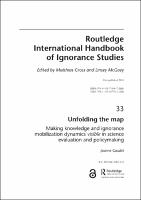Chapter 33 Unfolding the map
Proposal review
Making knowledge and ignorance mobilization dynamics visible in science evaluation and policymaking
Abstract
Once treated as the absence of knowledge, ignorance today has become a highly influential topic in its own right, commanding growing attention across the natural and social sciences where a wide range of scholars have begun to explore the social life and political issues involved in the distribution and strategic use of not knowing. The field is growing fast and this handbook reflects this interdisciplinary field of study by drawing contributions from economics, sociology, history, philosophy, cultural studies, anthropology, feminist studies, and related fields in order to serve as a seminal guide to the political, legal and social uses of ignorance in social and political life.
Keywords
Routledge International Handbook of Ignorance; Matthias Gross; Linsey McGoey; ignorance in history; Alfred Nordmann; Erinn Cunniff Gilson; Kevin Elliott; Noortje Marres; Michael Smithson; Ignorance as Asset and Threat; Janet A. Kourany; gendered science; medical ignorance; Ann Kerwin; S. Holly Stocking; Lisa Holstein; Jerome Ravetz; Daniel Kleinman; Registering the Unknown: Ignorance as Methodology; Helen Pushkarskaya; Mike Michael; Nina Janich; David Stark; Basille Zimmermann; Ignorance, Oppression and Collective Memory; Christian Kuhlicke; Brian Wynne; Liana Chua; Peter Wehling; Julie Laplante; Valuing and Managing the Unknown in Science, Technology and Engineering; David Hess; Steve Rayner; Mary Douglas; institutional memory; Joanne Gaudet; Joanna Kempner; Scott Frickel; Andrew Stirling; Ignorance in Law and Security Studies; Claudia Aradau; Brian Rappert; Brian Balmer; Ignorance in Economic Theory and Practice; Oliver Kessler; Allison Stewart; Joanne Roberts; Ekaterina SvetlovaISBN
9781138596290Publisher
Taylor & FrancisPublisher website
https://taylorandfrancis.com/Publication date and place
2015Imprint
RoutledgeClassification
Society and culture: general
Sociology


 Download
Download